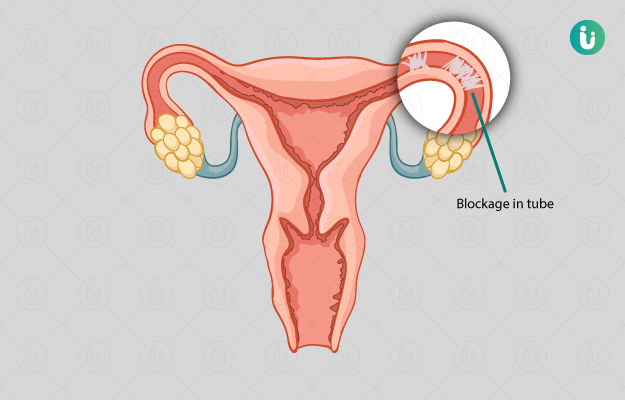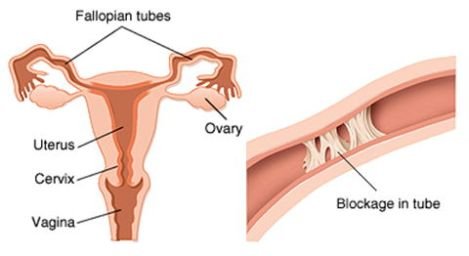
If you are facing tubal blockage and want to know how to prevent it ?
Tubal blockage or blocked Fallopian Tubes are the problem related to female reproductive organs that bind the ovaries & the uterus. Every month, the ovulation takes place roughly in the middle of the menstrual cycle, when the tubes fetch the eggs from the ovaries.
Around this time, if intercourse happens, the settled semen travels to the tubes & fertilizes with the egg & then the fertilized embryo travels down from the tube to the uterus.
Hence, Tubal blockage is established when the passage through which the sperm advances to fertilize with the eggs and also the path of the fertilized egg to the uterus is blocked.
Frequent reasons behind blocked tubes might be due to scar tissue, infection, pelvic adhesions & pelvic inflammatory disease.
Symptoms: Blocked tubes do not often show any symptoms apart from conceiving.
• Common Pelvic pain.
• Dyspareunia or pain during intercourse.
• Foul vaginal discharge.
• Body temperature is over 101°C (in acute cases).
• Nausea & vomiting (in acute cases).
• Severe lower abdominal or pelvic pain (in acute cases).
• Infertility.
Over 30% of women who are diagnosed with infertility issues have a higher possibility of damaged or blocked tubes.
A specific kind of blocked fallopian tube, called Hydrosalpinx may lead to abdominal pain & unusual vaginal discharge but not every woman shows these symptoms.

Hydrosalpinx is confirmed when the tube is filled with filled which makes it dilated & blocked. The fluid obstructs the egg & the sperm, hence, preventing fertilization & pregnancy.
• Proximal blockage (near the uterus) is caused by tubal spasm, scarring from an inflammatory condition, or blockage from debris or tubal polyps.
• Midsegment blockage (middle of the tube) is caused by tubal ligation, prior ectopic pregnancy, pelvic adhesions, or endometriosis.
• Distal blockage or Hydrosalpinx (end of the tube i.e, near the ovaries) is caused by prior to Pelvic Inflammatory Disease (PID) or extensive endometriosis.
• Total Tubal blockage.
• Blocked fallopian tubes are a common cause of infertility.
• If both the tubes are fully blocked then pregnancy without treatment will be impossible.
• If the fallopian tubes are partially blocked then one can potentially conceive but the chances of ectopic pregnancy increase.
• If only one fallopian tube is blocked, the blockage most likely will not affect fertility because the egg can still travel through the unaffected tube.
The most common complication of blocked tubes is Ectopic Pregnancy. If a fallopian tube is partially blocked, in that case, an egg may be able to fertilize but it may get stuck in the tubes after fertilization. This results in Ectopic pregnancy which leads to a medical emergency.
Due to these risks, doctors often recommend IVF treatment instead of surgery or correction of blocked fallopian tubes.
• Endometriosis which can cause a tissue build-up in the tubes.
• Pelvic inflammatory Disease (PID), a disease that can cause scarring or hydrosalpinx.
• Any current history of Gonorrhea.
• Scars that might have been caused by ectopic pregnancies or abdominal surgery.
• Large fibroids can sometimes block the tubes.
• Some sexually transmitted infections such as chlamydia or Gonorrhea.
• Laparoscopy.
• HSG (Hystero Salpingogram).
• HYCOSY.
Making certain lifestyle & dietary changes may help boost female fertility. However, there is little scientific evidence to suggest that natural treatments can help to treat blocked tubes.
If the fallopian tubes are blocked by a small amount of scar tissue or adhesions, the doctor can use Laparoscopic surgery to remove the blockage and open the tubes. But if they are blocked by a large amount of scar tissue or adhesions, the treatment to remove the blockage may not be possible.
A new non-surgical method called “Fallopian Tube Catheterization” helps to open the blocked tubes to enhance a woman’s chances to conceive.
Male fertility is closely associated with the health of sperm. A healthy sperm count and strong motility are essential for...
Meet Priyanka, a busy marketing professional. Lately, her periods have become heavy and unpredictable. Cramping disrupts her workday, and she’s...
Role of IVF in Overcoming Infertility Challenges in Endometriosis Endometriosis is an often painful disorder in which tissue similar to...
Journey towards parenthood Infertility and childlessness can be challenging journeys for couples to navigate. The emotional and physical toll of...
The "Save the Sibling" Program "Save the Sibling" program, a collaboration of Renew Healthcare, Cordlife, and HCG EKO offers hope...
What is PCOD? PCOD, also known as Polycystic Ovary Syndrome, is a common hormonal disorder that affects women of reproductive...
Intrauterine insemination aka IUI is a common fertility treatment that many couples opt for having a biological child. The experts...
Getting sperm by any means for fertility purposes is known as sperm extraction. There are several ways to get sperm,...
Embryo Glue is a recent fertility procedure that doctors use to increase the chances of a successful IVF. One of...
IVF is an expensive procedure and requires several sessions to complete the treatment. With all the physical and mental pressure,...
